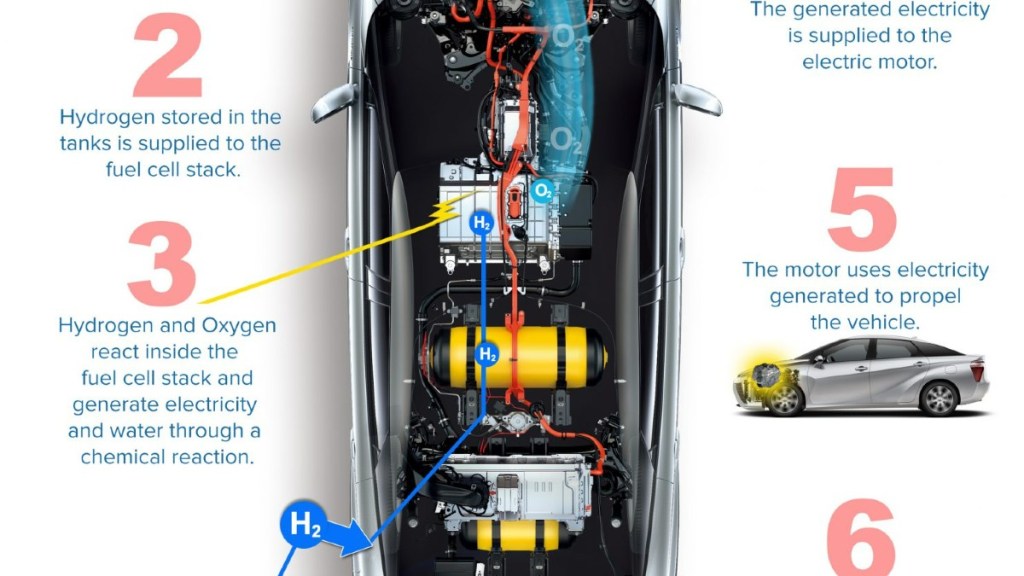Supporting India’s National Hydrogen Mission and in line with its global commitment to Carbon Neutrality by 2050 and target of achieving Net Zero in manufacturing operations by 2035, Toyota Kirloskar Motor (TKM)announced the supply of its Fuel Cell Module (one unit) to Ashok Leyland to build fuel-cell commercial vehicle in India for proto examination and feasibility study purposes.
Toyota continues to focus on the hydrogen technology and promotion of the fuel cell module usage across various sectors to enhance wider adoption and achieve scalability. The hydrogen fuel cell module provides energy source to serve various applications which is essentially the key to realise competitiveness and creation of future sustainable hydrogen society.
Fuel cell electric vehicles (FCEVs) are powered by hydrogen which produce no tailpipe emissions, being the cleanest fuel. Green hydrogen is generated from renewable energy sources and can provide storage requirements for solar and wind energy which is critical for their rapid take off at a greater scale.
Hydrogen push
Hydrogen has higher energy density over batteries, can store energy for a longer duration and is portable, thus making it an excellent energy carrier for diverse applications. With these advantages, hydrogen can play a significant role in our country’s goal toward achieving energy self-reliance and mitigating carbon emissions.
Commenting on this clean mobility initiative, Sudeep S Dalvi, Senior Vice President and Chief Communication Officer of Toyota Kirloskar Motor, said “Reducing tailpipe emissions and carbon footprint has always been extremely important for us at Toyota and we are also committed to contribute towards the national target of energy self-reliance. Globally, the energy industry is working on the technological innovations of carbon-neutral fuels such as hydrogen and biofuels. Through this initiative, we hope to promote wider use of hydrogen as a fuel which can help to create a hydrogen society in harmony with nature.”
The company strives to offer array of electrified and alternate fuel vehicles to minimise CO2 emissions by taking into consideration the energy generation, infrastructure readiness and consumer adoption of each country/region. It has been developing green and clean technologies promoting sustainability across regions.
Moreover, given India’s energy mix, its unique consumer profile and needs, infrastructure readiness, and the Government’s diversified efforts towards becoming ‘Atmanirbhar’ in energy by 2047, Toyota is advancing mobility solutions with greater agility, thereby introducing, and supporting multiple clean technology pathways by joining hands with other stakeholders with mutual interest and aim to contribute to our nation’s carbon neutral targets.
Talking about this initoative, Dr N Saravanan, Chief Technology Officer of Ashok Leyland, said “Ashok Leyland is excited to collaborate with Toyota Kirloskar Motor to bring their globally renowned and proven fuel cell module system to the commercial vehicle sector in India. Ashok Leyland’s track record in bringing innovative and differentiated products combined with Toyota’s technology leadership in fuel cells has created a massive opportunity to conduct proto examination and feasibility study towards decarbonizing both goods and people transportation.”
When it comes to hydrogen based electrified vehicle technology, fuel cell module is the heart which powers the hydrogen electric power train. Toyota given its strong technological capabilities intends to move forward in sure-footed steps to promote and enhance the use of fuel-cell modules in India, to develop zero carbon emission vehicles. Further to achieve zero CO2 emissions in more challenging applications such as trucks and heavy transport, trains, buses, aviation, shipping, forklifts, and industrial processes, hydrogen will play an important role.
The Government of India announced the National Hydrogen Mission (NHM) in the Union Budget for 2021-2022. NHM has drawn a road map for the usage of hydrogen as an energy source. This mission aims to push for the implementation of hydrogen energy that will drive the country in the right direction of making the best out of the renewable energy sector.


















